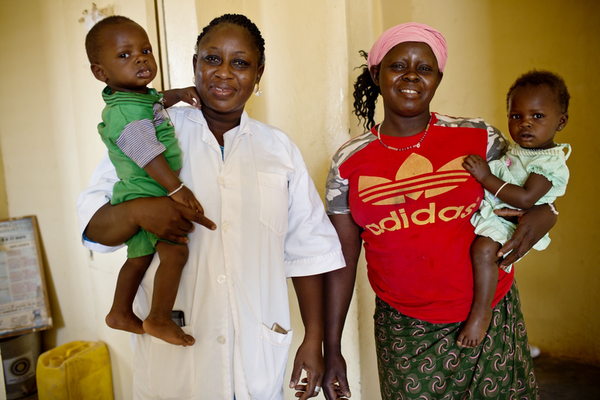

A Tale of Two Mothers
Kounda, Burkina Faso — Elyse Gansonre is a mother of four. Her husband is a farmer. When her husband harvests rice from their land, Elyse sells it for a small profit at a stall in the market.
Jacqueline Tiendrebeogo is 9 months pregnant with her fourth child. Her husband helps others in the community build their houses.
Both women see the same Burkinabe midwife, Clemence. And they share something else. Both struggle with a disease all too common for mothers in Burkina Faso: malaria.
Two of Elyse’s children died young. “The first died when they were 9 months old, and the second, at 1 year,” she says. Years later, during Elyse’s first trimester of pregnancy with her twins, she got malaria and worried she’d lose these children, too.
She’s not alone. Fifty million women become pregnant each year in malaria-endemic areas; 10,000 of them die due to malaria, and 10 times that many newborns don’t survive because of the disease.



Midwife Clemence diagnosed Elyse quickly and started her on treatment. “If I hadn’t had the treatment,” says Elyse, “I think I would have lost the twins or they would not have been born as healthy.”

Clemence learned the skills needed to better identify and treat malaria in a Jhpiego-supported project funded by the United States Agency for International Development called Improving Malaria Care. In partnership with the Government of Burkina Faso, the project empowered more than 1,800 providers — a quarter of the country’s health care workforce — to manage cases and provide regular preventive medicine to stop pregnant women from contracting the disease. Over 3 years, Improving Malaria Care impacted 1,349 facilities across a majority of the country, a truly nationwide effort.
Today, in Burkina Faso, nearly 100 percent of suspected malaria cases are being tested, and more than 1 million insecticide-treated bed nets have been distributed to women — a fourfold increase since 2015.

Antenatal Antimalarials
“The biggest problem with getting the mothers [to the health facility] is communicating to them the need to come … they need to be told that this treatment is available and important,” midwife Clemence says. Her health facility coordinates communitywide events to help educate women and families on the importance of getting preventive treatment during pregnancy. Health workers even go door-to-door to drive home the point.
“If there is a woman who isn’t coming, we will send out a community health worker,” Clemence says. “The biggest challenge in this community is poverty. Life is hard for [women]. Our job is to help them understand how they need to look after themselves better … but this is a challenge when they are so poor and need to work to survive.”
 Jacqueline, in her final trimester, knows how important it is to receive that intermittent preventive treatment. “I have now taken it three times,” she says — a critical step toward a malaria-free pregnancy. She’s made a routine of antenatal care attendance and antimalarial acceptance.
Jacqueline, in her final trimester, knows how important it is to receive that intermittent preventive treatment. “I have now taken it three times,” she says — a critical step toward a malaria-free pregnancy. She’s made a routine of antenatal care attendance and antimalarial acceptance.
Almost half of the world’s population is at risk of malaria, but countries like Burkina Faso have made tremendous progress. In just 3 years, the Improving Malaria Care partnership, with leadership from the National Malaria Control Program, heavily contributed to averting an estimated 33,199 deaths and a 50 percent nationwide decline in malaria-related mortality.
For mothers like Elyse and Jacqueline, the improvement makes a dramatic difference. Elyse’s twins are healthy and malaria-free. Jacqueline’s pregnancy was smooth, thanks to the preventive treatment she received.
“We hope that the future will be better for us and that my children will be OK. The children are my future,” Jacqueline says. “Before, we didn’t have this treatment, or the mosquito nets, or the drugs, and many women and children were getting sick. Now things are better.”
As the world comes together on April 25 to mark World Malaria Day, the day’s theme celebrates that we’re #readytobeatmalaria. Soon, we’ll be ready for something else in Burkina Faso: to celebrate an end to malaria forever.






